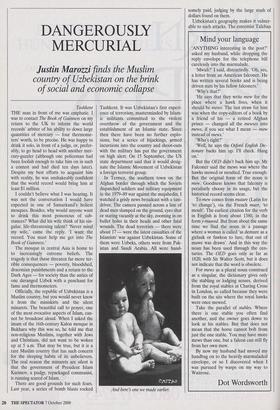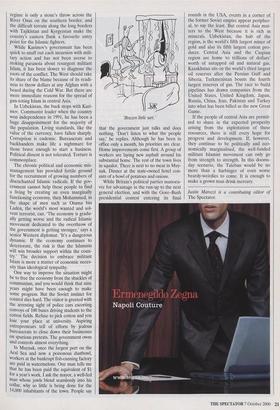DANGEROUSLY MERCURIAL
Justin Marozzi finds the Muslim
country of Uzbekistan on the brink of social and economic collapse
Tashkent THE man in front of me was emphatic. I was to contact The Book of Guinness on my return to the UK to inform the world records' arbiter of his ability to down large quantities of mercury — four thermome- ters' worth, to be precise. He was happy to drink it solo, in front of a judge, or, prefer- ably, to go head to head with another mer- cury-guzzler (although one policeman had been foolish enough to take him on in such a contest and had died ten days later). Despite my best efforts to acquaint him with reality, he was unshakeably confident that the world record would bring him at least $1 million I couldn't believe what I was hearing. It was not the conversation I would have expected in one of Samarkand's holiest mosques. Besides, why would anyone want to drink this most poisonous of sub- stances? What did his wife think of his sin- gular, life-threatening talent? 'Never mind my wife,' came the reply. 'I want the record. You must help me get into The Book of Guinness.'
The mosque in central Asia is home to to increasingly extreme beliefs. The tragedy is that these threaten far more ter- rible consequences — poverty, bloodshed, draconian punishments and a return to the Dark Ages — for society than the antics of one deranged Uzbek with a penchant for fame and thermometers.
Officially, the republic of Uzbekistan is a Muslim country, but you would never know it from the miniskirts and the silent minarets. The beautiful call to prayer, one of the most evocative aspects of Islam, can- not be broadcast aloud. When I asked the imam of the 16th-century Kalon mosque in Bukhara why this was so, he told me that non-religious Muslims, together with Jews and Christians, did not want to be woken up at 5 a.m. That may be true, but it is a rare Muslim country that has such concern for the sleeping habits of its unbelievers. The real reason the minarets are silent is that the government of President Islam Karimov, a pudgy, repackaged communist, is running scared of Islam.
There are good grounds for such fears. Last year, a series of bomb blasts rocked Tashkent. It was Uzbekistan's first experi- ence of terrorism, masterminded by Islam- ic militants committed to the violent overthrow of the government and the establishment of an Islamic state. Since then there have been no further explo- sions, but a series of hijackings, armed incursions into the country and shoot-outs with the military has put the government on high alert. On 15 September, the US state department said that it would desig- nate the Islamic Movement of Uzbekistan a foreign terrorist group.
In Termez, the southern town on the Afghan border through which the Soviets dispatched soldiers and military equipment in the 1979-89 war against the mujahedin, I watched a grisly news broadcast with a taxi- driver. The camera panned across a line of dead men slumped on the ground, eyes shut or staring vacantly at the sky, zooming in on bullet holes in their heads and other fatal wounds. The dead terrorists — there were about 17 — were the latest casualties of the Islamists' war against Uzbekistan. Some of them were Uzbeks, others were from Pak- istan and Saudi Arabia. All were hand- And here's one we made earlier. somely paid, judging by the large stash of dollars found on them.
Uzbekistan's geography makes it vulner- able to such attacks. The extremist Taleban regime is only a stone's throw across the River Oxus on the southern border, and the difficult terrain along the long borders with Tajikistan and Kyrgyzstan make the country's eastern flank a favourite entry point for the Islamic fighters.
While Karimov's government has been quick to snuff out each incursion with mili- tary action and has not been averse to stoking paranoia about resurgent militant Islam, it has been slower to diagnose the roots of the conflict. The West should take its share of the blame because of its readi- ness to throw dollars at any Afghan with a beard during the Cold War. But there are more immediate reasons for the spread of gun-toting Islam in central Asia.
In Uzbekistan, the buck stops with Kari- mov. Communist leader when the country won independence in 1991, he has been a huge disappointment for the majority of the population. Living standards, like the value of the currency, have fallen sharply. Corruption is endemic. Bureaucrats and backhanders make life a nightmare for those brave enough to start a business. Political dissent is not tolerated. Torture is commonplace.
The chronic political and economic mis- management has provided fertile ground for the recruitment of growing numbers of disenchanted Islamic radicals. If the gov- ernment cannot help these people to find a living by creating an even marginally functioning economy, then Mohammed, in the shape of men such as Osama bin Laden, the world's most wanted and sol- vent terrorist, can. 'The economy is gradu- ally getting worse and the radical Islamic movement dedicated to the overthrow of the government is getting stronger,' says a senior Western diplomat. 'It's a dangerous dynamic. If the economy continues to deteriorate, the risk is that the Islamists will win broader support within the coun- try.' The decision to embrace militant Islam is more a matter of economic neces- sity than ideological sympathy.
One way to improve the situation might be to free the economy from the shackles of communism, and you would think that nine years might have been enough to make some progress. But the Soviet instinct for control dies hard. The visitor is greeted with the arresting sight of police cars escorting convoys of 100 buses driving students to the cotton fields. Refuse to pick cotton and you lose your place at university. Aspiring entrepreneurs tell of efforts by jealous bureaucrats to close down their businesses on spurious pretexts. The government owns and controls almost everything.
In Muynak, once the largest port on the Aral Sea and now a poisonous dustbowl, workers at the bankrupt fish-canning factory are paid in watermelons. One man tells me that he has been paid the equivalent of $1 for a year's work. I ask the mayor, a well-fed man whose jowls blend seamlessly into his collar, why so little is being done for the 14,000 inhabitants of the town. People say Brazen little tart.'
that the government just talks and does nothing. 'Don't listen to what the people say,' he replies. Although he has been in office only a month, his priorities are clear. Home improvements come first. A group of workers are laying new asphalt around his substantial home. The rest of the town lives in squalor. There is next to no meat in Muy- nak. Dinner at the state-owned hotel con- sists of a bowl of potatoes and onions.
While Britain's political parties manoeu- vre for advantage in the run-up to the next general election, and with the Gore—Bush presidential contest entering its final rounds in the USA, events in a corner of the former Soviet empire appear peripher- al, to say the least. But central Asia mat- ters to the West because it is rich in minerals. Uzbekistan, the hub of the region, is the world's fifth largest miner of gold and also its fifth largest cotton pro- ducer. Central Asia and the Caspian region are home to trillions of dollars' worth of untapped oil and natural gas. Kazakhstan sits on the world's third largest oil reserves after the Persian Gulf and Siberia. Turkmenistan boasts the fourth largest reserves of gas. The race to build pipelines has drawn companies from the United States, United Kingdom, Japan, Russia, China, Iran, Pakistan and Turkey into what has been billed as the new Great Game.
If the people of central Asia are permit- ted to share in the expected prosperity arising from the exploitation of these resources, there is still every hope for progress and development. If, however, they continue to be politically and eco- nomically marginalised, the well-funded militant Islamist movement can only go from strength to strength. In this dooms- day scenario, the Taleban would be no more than a harbinger of even worse beardy-weirdies to come. It is enough to make a grown man drink mercury.
Justin Marozzi is a contributing editor of The Spectator.



















































































 Previous page
Previous page